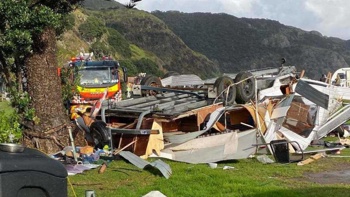Auckland's fuel infrastructure needs immediate investment to ensure there isn't complete disruption to Auckland Airport if something goes wrong with the supply line.
That's the finding of a government inquiry into the 2017 Ruakaka pipeline failure which caused a fuel crisis resulting in the cancellation of more than 100 flights at Auckland Airport. Some petrol stations ran out of fuel.
The report, released today, said the damage to the pipeline, which provides the main supply of petrol, diesel and jet fuel for Auckland, "must have occurred" by a contractor looking for kauri logs on the site three years earlier.
It established a 16-tonne digger was working on the property between August 26 and 28 2014, a few months after Refining NZ had carried out a technical inspection of the whole pipeline.
Despite the landowner advising the contractor not to dig in the back paddock that contained the pipeline, a neighbour saw the digger working there.
"Although the contractor denied it, we were satisfied that he struck the pipeline with the bucket of the digger and damaged it," the report said.
"The contractor did not report the damage to anyone. The landowner was not aware that the pipe had been exposed and struck."
/arc-anglerfish-syd-prod-nzme.s3.amazonaws.com/public/WWF75BH66RDVTMLIFT7QVA7DJQ.jpg)
Almost three years later, on September 14, 2017, the inquiry found the pipeline ruptured where it had been damaged and jet fuel escaped into several properties.
The rupture stopped the transmission of fuels into Auckland for 10 days and airlines had to limit jet fuel to 30 per cent of their usual usage, which caused significant disruption to flights to and from Auckland.
The inquiry found Auckland's jet fuel supply was currently not sufficiently resilient.
"With only a single supply chain for jet fuel, a single point of failure at any point along that chain can cause a complete disruption of supply to Auckland Airport.
"There is limited storage near the airport to provide cover for an outage and the number of days of cover that storage provides is decreasing as the daily demand for jet fuel grows.
"This means our vulnerability is increasing."
Parts of the supply chain would not be able to meet basic demand in a few years' time, let alone recover from, or provide resilience, during any significant outage.
The report concluded there was a need to invest in further infrastructure without delay.
This was to ensure that capacity in the supply chain near the airport will be able to meet the increasing demand, and there was sufficient cover for an outage.
"Ideally, the industry would develop a second permanent supply chain," it said.
The report also called for a new National Fuel Emergency Plan, and for the Ministry of Business, Innovation and Employment to take a leadership role.
Current fuel supply chain infrastructure was largely owned or controlled by the three major fuel companies: BP, Mobil and Z Energy. The 2017 incident exposed major holes in this infrastructure.
Dr Nirmal Nair, from Auckland University's Department of Electrical, Computer, Software Engineering, said the fuel rupture incident "brought into focus the relative blase and unprepared attitude of successive New Zealand governments towards formulating a serious national fuel emergency policy".
"The national supply situation appears to be not adequately addressed," Nair said.
University of Auckland Professor of Operations and Supply Chain Tava Olsen said the report findings were "important but not surprising".
/arc-anglerfish-syd-prod-nzme.s3.amazonaws.com/public/CYWG3S2ERRDEDO3GGWKMJ6AYP4.jpg)
"The creation of the national fuel emergency plan seems overdue . . . hopefully they will look at Whenuapai as a potential back-up site for Auckland jet fuel rather than expecting the commercial companies to shoulder all back-up responsibilities."
The report found it "was lucky" that the rupture happened when and where it did.
"The location was easy to access and not in a highly populated area, so the containment and repair could be carried out quickly, with minimum of risk to people," it said.
Significant risk of fire and explosion was also reduced because it was jet fuel and not petrol, which was more flammable.
"It was lucky that the rupture occurred outside peak travel times... in short, the consequences could have been far worse than they were."
Government funding for the fuel pipeline inquiry was slashed from the originally proposed $3.1 million to $1.1 million, according to Cabinet papers.
This followed a decision to restrict the scope of the inquiry to fuel supply into Auckland rather than looking into fuel supplies across the nation.
Massey University Professor Ralph Sims, Sustainable Energy and Climate Mitigation, said: "The government inquiry concentrated on oil product supplies to Auckland but the next disruption, for whatever reason, could be anywhere in the country."
Fuel pipeline inquiry
• The damage was caused by a contractor operating a 16-tonne digger looking for kauri logs in 2014
• It's lucky the rupture happened in a location that was easy to access and wasn't in a highly populated area or the consequences could have been a lot worse
• Auckland's jet fuel supply is currently not sufficiently resilient
• Immediate investment is needed into fuel supply infrastructure
• A new national fuel emergency plan is needed with MBIE playing a lead role
Take your Radio, Podcasts and Music with you









